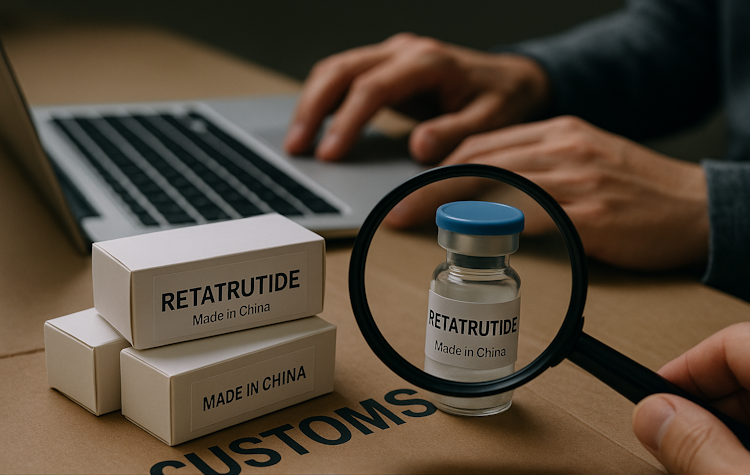When you’re dealing with pharmaceutical intermediates, peptides like retatrutide (or any GLP-1/GIP hybrid) are not commodities you can treat casually. They require strict manufacturing and storage standards. Many overseas suppliers (especially those claiming to ship direct from a factory in China) may look appealing, but the reality can hide considerable risks.
Here are key areas of concern:
Purity and mislabeling. The active peptide must meet high standards of identity, purity and stability. According to the Food and Drug Administration (FDA), when dealing with synthetic peptides (even generics) you must show the molecule is the same, and the impurity profile is acceptable—any new impurity above 0.5 % of the drug substance requires justification.
Learn how to prepare peptides correctly in our Retatrutide Reconstitution Guide.
If a supplier cuts corners, you may get something that looks like the target peptide but isn’t — truncated chains, unwanted isomers, or heavy contamination. The European Medicines Agency (EMA) guideline for synthetic peptides makes clear that manufacturing must control deletion-sequences, insertion-sequences, racemization, and related substances.
Contamination and manufacturing controls. Real peptide production—especially when scaled—requires clean rooms, validated equipment, documented processes, traceability of raw materials, etc.
A low-cost overseas factory may skip or poorly implement such controls. For example, residual solvents, elemental impurities, oxidized peptides or aggregates can all come from inadequate manufacturing or storage.
Storage, shipping and chain of custody. Peptides are sensitive—temperature, humidity, even time in transit matter. Buying a bulk shipment from China doesn’t guarantee professional storage, cold-chain handling, or integrity of the production batch. If the peptide degrades, you lose potency or worse, cause immune or other unforeseen problems.
Third-party verification. Many overseas offers from these companies skip transparent COAs (Certificates of Analysis), HPLC (high performance liquid chromatography) purity data, or independent lab testing. Without third-party verification, you’re trusting the seller’s word.
Bottom line: a lower price doesn’t mean the same product — it often means you’re getting something untested, or worse, mislabeled.
Common Red Flags When Buying From Overseas
- If you’re browsing offers for bulk retatrutide from China (or any peptide) here are warning signs to watch out for:
- No COA provided (or the COA is very generic, no batch number, no lab signature).
- No evidence of third-party testing or independent verification of the peptide chain.
- The supplier is vague about their address, manufacturing equipment, or facility (e.g., “lab in China” without a real company name).
- Photos on the listing look like stock photos, or show the same vial for multiple orders (suggesting fake).
- The price is unbelievably low compared to what a properly manufactured pharmaceutical intermediate would cost with full verification.
- Payment methods are strange or insecure (for example being told to pay via Western Union or wire transfer only—not uncommon in sketchy setups).
- The factory claims to produce “customized” peptides at high volume for cheap—while real peptide manufacturers often focus on smaller scale, highly controlled production.
- No information on how the peptide was synthesized / purified (SPPS, HPLC purification, stability data, how stored).
- The listing doesn’t mention GMP or ISO certification, or the certifications sound inflated.
- Shipping and handling terms are vague (no temperature control, no tracking, no mention of how product is packed).
If you see one or more of these, tread very carefully.
Not sure what a safe dosing pattern looks like? Review our Retatrutide Dosage Schedule Chart.
How to Verify Authenticity
You don’t have to simply assume “overseas = bad,” but you must verify thoroughly. Here is a checklist:
- Request a full, valid COA from the supplier:
- Batch number, date of manufacture, expiration date.
- Identity test (mass spec, sequence confirmation).
- Purity by HPLC (often expressed in %).
- Impurity profile (especially “peptide-related impurities” as defined by FDA guideline).
- Residual solvents, elemental impurities, aggregates (if available).
- Storage instructions and results of stability testing (if any).
- Check supplier credentials.
When checking supplier credentials, make sure the company has a verifiable name and presence—such as “XYZ Biotech Co., Ltd.” in Shanghai or another identifiable location. You should be able to find a legitimate manufacturing address and, ideally, photos or documentation of their lab and production factory. Confirm whether they hold valid GMP or ISO certifications (though remember that a certificate alone doesn’t guarantee full compliance). Finally, look into whether the company supplies other reputable labs or institutions; established partnerships can be a good indicator of reliability and quality. - Look for U.S.-based resellers or partners.
- A supplier that has a U.S. presence or partnership may allow for easier recourse, shipping, returns, verification of handling.
- If the only route is direct from overseas factory with obscure logistics, risk is higher.
- Ask for shipping and handling proof.
Ask for clear proof of shipping and handling procedures. Verify exactly how the product will be shipped—whether it’s temperature-controlled, packed with dry ice, or otherwise protected during transit. Confirm how long it takes from production to shipping, since delays can affect stability and quality. It’s also important to know whether the product is tested for integrity after shipping, ensuring it arrives in the same condition as when it left the factory. - Compare lab data across batches.
- Real manufacturers (especially those that meet GMP) will have batch-to-batch consistency. Variations in purity or high levels of impurities should raise red flags.
- Use HPLC retention time, mass spec peaks etc if you have access to analytical services.
- Consider the “value” over price.
When evaluating peptide offers, always consider the value over the price. If one supplier lists their product at 60–70% less than competitors, it’s worth asking what corners are being cut. Producing a genuine, high-purity peptide with full documentation, proper equipment, and safe handling practices isn’t cheap. If a deal seems too good to be true, it probably is—ask why the price is so low before placing an order.
Safer Alternatives for U.S. Buyers
If you’re in the U.S. and you want reliable quality and security, consider shifting your focus from “cheap overseas bulk” to “trusted sourcing with full transparency.” Here’s how:
- Prioritize U.S.-based research supply companies (or internationally known firms with U.S. distribution) that clearly state their manufacturing development, purification, and QC practices.
- Look for suppliers that publish or share full analytical reports (HPLC, MS, impurity profiles) and have independent auditing or third-party verification.
- Choose suppliers whose manufacturing lines adhere to GMP (or at least pharmaceutical grade standards)—for example, facilities that use GMP-qualified equipment and validated cleaning processes.
- Ask about manufacturers who specialize in peptide therapeutic production—it’s not about where it’s made, it’s about who’s verifying it. If the U.S. distributor is sourcing from China but requiring full documentation, shipping controls, chain of custody—then the risk is lower.
- Recognize that paying more for verified purity and protection is a wise investment. Your health and trust are worth more than a bargain.
Compare Retatrutide’s performance with Retatrutide vs Semaglutide to understand why quality matters.
Conclusion
Buying bulk retatrutide from unverified Chinese suppliers carries major risks—including unknown purity, possible contamination, lack of pharmaceutical-grade controls, vague handling, or no recourse if something goes wrong.
If you’re serious about quality and safety for weight loss, stick with reputable U.S. sources that offer verified purity, batch testing, transparent lab documentation and responsible shipping. Your health and trust are worth more than a bargain.
Considering multi-agonist options? See our Mazdutide vs Retatrutide Comparison.

